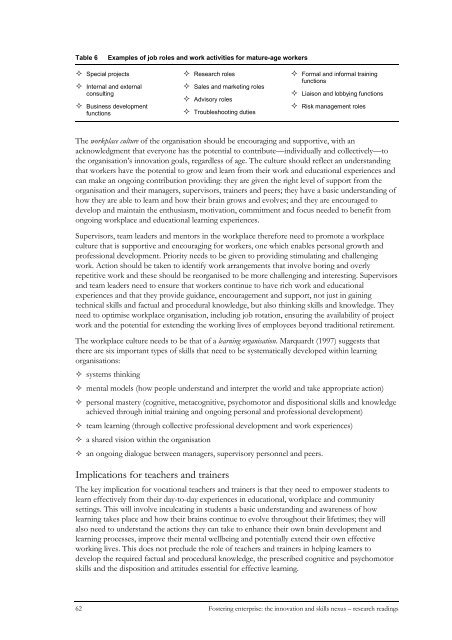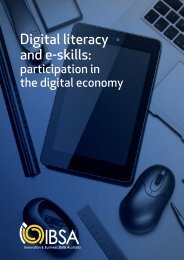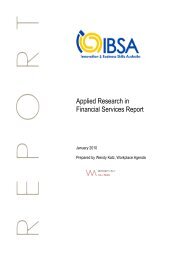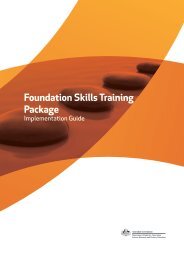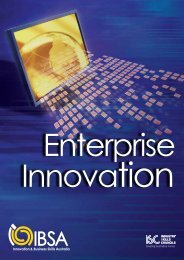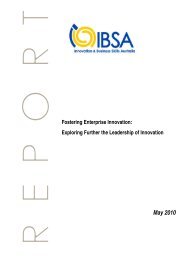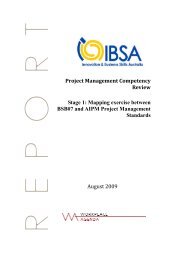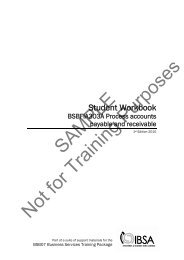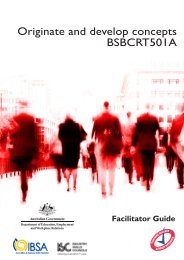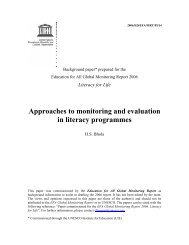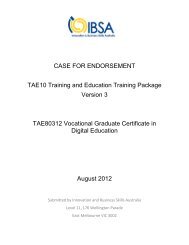Table 6Examples of job roles and work activities for mature-age workers Special projects Internal and externalconsulting Business developmentfunctions Research roles Sales and marketing roles Advisory roles Troubleshooting duties Formal and informal trainingfunctions Liaison and lobbying functions Risk management rolesThe workplace culture of the organisation should be encouraging and supportive, with anacknowledgment that everyone has the potential to contribute—individually and collectively—tothe organisation’s innovation goals, regardless of age. The culture should reflect an understandingthat workers have the potential to grow and learn from their work and educational experiences andcan make an ongoing contribution providing: they are given the right level of support from theorganisation and their managers, supervisors, trainers and peers; they have a basic understanding ofhow they are able to learn and how their brain grows and evolves; and they are encouraged todevelop and maintain the enthusiasm, motivation, commitment and focus needed to benefit fromongoing workplace and educational learning experiences.Supervisors, team leaders and mentors in the workplace therefore need to promote a workplaceculture that is supportive and encouraging for workers, one which enables personal growth andprofessional development. Priority needs to be given to providing stimulating and challengingwork. Action should be taken to identify work arrangements that involve boring and overlyrepetitive work and these should be reorganised to be more challenging and interesting. Supervisorsand team leaders need to ensure that workers continue to have rich work and educationalexperiences and that they provide guidance, encouragement and support, not just in gainingtechnical skills and factual and procedural knowledge, but also thinking skills and knowledge. Theyneed to optimise workplace organisation, including job rotation, ensuring the availability of projectwork and the potential for extending the working lives of employees beyond traditional retirement.The workplace culture needs to be that of a learning organisation. Marquardt (1997) suggests thatthere are six important types of skills that need to be systematically developed within learningorganisations: systems thinking mental models (how people understand and interpret the world and take appropriate action) personal mastery (cognitive, metacognitive, psychomotor and dispositional skills and knowledgeachieved through initial training and ongoing personal and professional development) team learning (through collective professional development and work experiences) a shared vision within the organisation an ongoing dialogue between managers, supervisory personnel and peers.Implications for teachers and trainersThe key implication for vocational teachers and trainers is that they need to empower students tolearn effectively from their day-to-day experiences in educational, workplace and communitysettings. This will involve inculcating in students a basic understanding and awareness of howlearning takes place and how their brains continue to evolve throughout their lifetimes; they willalso need to understand the actions they can take to enhance their own brain development andlearning processes, improve their mental wellbeing and potentially extend their own effectiveworking lives. This does not preclude the role of teachers and trainers in helping learners todevelop the required factual and procedural knowledge, the prescribed cognitive and psychomotorskills and the disposition and attitudes essential for effective learning.62 Fostering enterprise: the innovation and skills nexus – research readings
In particular, in the course of their training function, vocational teachers and trainers need to beaware of the benefits of exposing students to experiences that span multiple intelligences andinclude a focus on thinking about learning and learning about thinking. Teachers and trainersshould endeavour as much as possible to organise and provide opportunities for rich learning thatcovers the full range of multiple intelligences and involves cognitive, physical and socialdimensions. They also need to promote the importance of an active physical, mental and social lifeto enable a long, productive, satisfying and enjoyable lifespan. This includes drawing students’attention to the value of exercising and caring for not only their bodies but also their minds.Some practical examplesThe following are three examples from industry that demonstrate how these various developmentsin cognition and neuroplasticity could be applied in practical innovative workplace situations. Whilethe examples are hypothetical, they are based on actual case studies. In considering these practicalcase studies, it is worth reiterating that the skills sets required in effective workplace and learningenvironments encompass not only critical cognitive skills and knowledge but also appropriatepersonal dispositions, attitudes and motivation.Practical example 1: an innovative ICT companyThe ICT company is an innovative service provider specialising in the provision of unique systemssolutions to organisations to enable them to integrate their computing infrastructure, internet andintranet systems, communication systems and information security requirements. The organisationspecialises in cloud system technology and video-conferencing to achieve cost efficiencies,operational flexibility and inter-connectiveness.The service provider regards its staff as the spearhead of its innovative capabilities, encouraging allpersonnel to work collaboratively—sharing ideas and providing ongoing informal guidance andassistance to each other. The CEO is a committed networker with vendors and other ICTcompanies and associations and promotes the concept of active networking to his personnel. Thecompany has six major sections—sales and marketing, finance and administration, planning andproduct development, engineering, the national operations centre (NOC) and customer service.There is a deliberate policy of gradually rotating personnel across the various sections. In someinstances, this is to enable personnel to gain experience and insight into the role and functions ofthe other sections, as well as to build relationships with the staff in those sections. In other instances,it forms part of career progression within the company. The company has periodic staff meetings inwhich personnel are encouraged to reflect on the company’s achievements and its opportunitiesand to share ideas on innovations and initiatives in products and systems that would benefit existingand potential customers. The company contracts mature-age, expert former employees to assist asbusiness advisors, market researchers and professional development consultants.Practical example 2: An innovative paper manufacturing companyThe innovative manufacturing company uses the latest automated manufacturing technologies toproduce paper products. It is vertically integrated with state-of-the-art monitoring and controlsystems designed to increase the precision and responsiveness of quality assurance and allow rapidresponse to product change requirements, while ensuring optimisation of efficiency andminimisation of production downtime. The vertical integration extends from logging, right throughproduction, to the distribution of final products. The overall production and delivery process isobserved and controlled through a central control room, where operators and technicians monitorand adjust every aspect of the production process. Using high-precision information and computingtechnologies integrated with the high-performance workforce, the company has the capability toNCVER 63
- Page 1:
Fostering enterprise:the innovation
- Page 4 and 5:
© Commonwealth of Australia, 2011T
- Page 7 and 8:
ContentsContributors 6Overview - Pe
- Page 9 and 10:
Ludger Deitmer works as a senior re
- Page 11 and 12:
Australian Chamber of Industry and
- Page 13 and 14: low-profile changes in processes or
- Page 15 and 16: that there are no generic innovatio
- Page 17 and 18: Thinking about the VET system speci
- Page 19 and 20: (of a vocation), as this increases
- Page 21: In an economic sense, the creation
- Page 24 and 25: the Korean War, to the success of i
- Page 26 and 27: products and processes, and then ex
- Page 28: Archibugi, D & Michie, J 1995, ‘T
- Page 31 and 32: What is this thing called innovatio
- Page 33 and 34: or soft skills. We can look at an e
- Page 35 and 36: Table 4 Skills used by innovation-a
- Page 37 and 38: In a study on the R&D technicians
- Page 39 and 40: aims to ‘ensure increased utilisa
- Page 41 and 42: influenced by the engineers but als
- Page 43 and 44: lack of research into the interrela
- Page 45 and 46: and control technologies to a great
- Page 47 and 48: fees to be paid to industrial bodie
- Page 49 and 50: Figure 2The apprenticeship training
- Page 51 and 52: Keeping a training log book is lear
- Page 53 and 54: Rauner, F, Rasmussen, L & Corbett,
- Page 55 and 56: workplaces are likely to have the s
- Page 57 and 58: and processing system, which was es
- Page 59 and 60: neuroplasticity and multiple intell
- Page 61 and 62: surroundings as much as possible, c
- Page 63: Personal and professional developme
- Page 67 and 68: personnel in both the development o
- Page 69 and 70: Why firms innovate andwhat it means
- Page 71 and 72: Adopting new or improved technologi
- Page 73 and 74: financial services (including life
- Page 75 and 76: ates. Cross-skilling and rostering
- Page 77 and 78: Resources for innovationImplementat
- Page 79 and 80: occupational skills can also be lea
- Page 81 and 82: The role of education and skillsin
- Page 83 and 84: Managerial innovation—Australia
- Page 85 and 86: al. 2009). A vast literature exists
- Page 87 and 88: In 2009, the London School of Econo
- Page 89 and 90: talent and address poor performers.
- Page 91 and 92: Figure 4Level of education—a glob
- Page 93 and 94: Skill and education—a cross-exami
- Page 95 and 96: Sub-group based on management pract
- Page 97 and 98: In summary, the analysis above rein
- Page 99 and 100: Table 9Econometric analysis of firm
- Page 101 and 102: Commonwealth of Australia 2008, Rev
- Page 103 and 104: Appendix A: The 18 dimensions of ma
- Page 105 and 106: Building innovation capacity:the ro
- Page 107 and 108: to innovate in order to then be cap
- Page 109 and 110: formation tool that can be implemen
- Page 111 and 112: The role of HRM in innovationThere
- Page 113 and 114: population was limited to private s
- Page 115 and 116:
performance. By comparison, the inn
- Page 117 and 118:
Schroeder, RG, Scudder, GD & Elm, D
- Page 119 and 120:
The predominance of a tacit element
- Page 121 and 122:
Table 1 Innovation frequencies by A
- Page 123 and 124:
flagged by highly significant (p <
- Page 125 and 126:
Generally, evidence suggests a degr
- Page 127 and 128:
AppendixScope of the BLDThe scope o
- Page 129 and 130:
Tradespeople and techniciansin inno
- Page 131 and 132:
products or services introduced ove
- Page 133 and 134:
who report overwhelmingly that thei
- Page 135 and 136:
more complex problem-solving: ‘as
- Page 137 and 138:
occupations such as scientists, eng
- Page 139 and 140:
TeachingWithin universities some tr
- Page 141 and 142:
of trades and technicians who had a
- Page 143 and 144:
implemented organisation-wide syste
- Page 145 and 146:
OECD (Organisation for Economic Co-
- Page 147 and 148:
first such studies on this topic an
- Page 149 and 150:
Training managers reported that the
- Page 151 and 152:
factors. Culturally, mining compani
- Page 153 and 154:
In terms of formal training, the tw
- Page 155 and 156:
The medium-console game companies t
- Page 157 and 158:
Mining firms use a Tayloristic work
- Page 159 and 160:
additional stream of funding explic
- Page 161 and 162:
detracted from economic growth for
- Page 163:
National Centre for Vocational Educ


